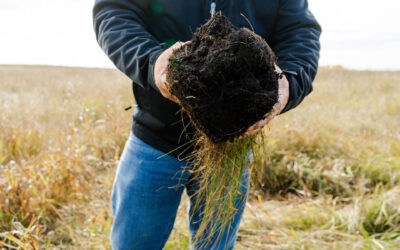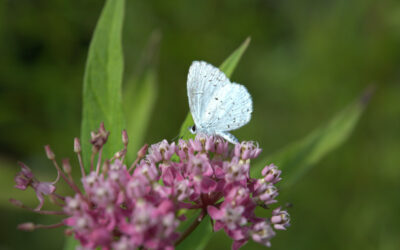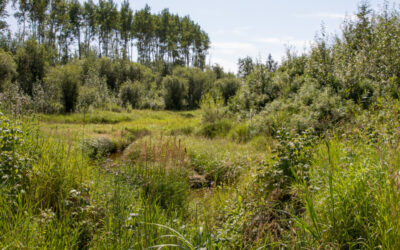Toronto, ON and Oakland, IA, March 12, 2024 – Iowa farmer Seth Watkins collaborated with Cara Morgan at Golden Hills Resource Conservation and Development (RC&D) to be the first US community to adopt the ALUS program, Canada’s leading agricultural ecosystem services program. The program will engage Southwest Iowa farmers and ranchers to produce new nature and ecosystem services, while addressing local rural environmental challenges related to soil health, water quality and wildlife habitat.
ALUS is a Canadian charitable organization delivering the only turnkey farmer-led community program that rewards farmers for creating, restoring, managing and maintaining nature-based projects on their lands. The program first launched in Blanchard, Manitoba in 2006. There are now 38 ALUS communities delivering the program across six Canadian provinces. These communities support over 1,600 farmers and ranchers in actively managing and maintaining more than 46,000 acres of nature-based projects. That’s approximately 186 sq km (72 sq mi) or about 1.5 times the size of San Francisco. These projects produce vital ecosystem services, like carbon sequestration and wildlife habitat, that help reduce the impacts of climate change and reverse biodiversity loss.
“Farmers and ranchers have the land, skills and knowledge to implement, manage and maintain nature-based projects that produce vital ecosystem services,” says Bryan Gilvesy, CEO, ALUS. “ALUS roots decision-making power in farming communities to develop solutions that help solve local environmental problems, while also addressing the dual global crises of climate change and biodiversity loss. We’re excited to launch the first US ALUS community in Southwest Iowa. As one of the most productive agricultural communities in the US, Iowa farmers have significant potential to create large-scale landscape-level change.”
Iowa is one of the top ten agricultural and cattle producing states in the US. Most of Iowa’s agricultural land was tallgrass prairie prior to settlement. Only 0.1% of Iowa’s prairie remains and most of the remnants are found in western Iowa. Creating tallgrass prairie along field edges and on marginal agricultural land, and incorporating prairie management into cattle grazing practices, is one of the areas of focus for the new ALUS community, ALUS Southwest Iowa Loess Bluffs (ALUS SWI).
“Adding tallgrass prairie to the working landscape can help address some of the environmental challenges we have in Iowa, like soil erosion and nutrient run-off,” says Seth Watkins of Pinhook Farms. “Prairie grasses have deep roots that hold soils in place, prevent weed encroachment and filter nutrients and pesticides from water runoff. They’re resilient to drought and poor soil conditions and provide habitat for a variety of wildlife, like pollinators, beneficial insects and birds. This is one of the regenerative agriculture practices that can help farmers and ranchers build longevity into their operations while producing environmental benefits.”
ALUS communities work directly with farmers and ranchers to create, manage and maintain new acres of nature that best suit their farm operations and address local environmental challenges. This includes grassland restoration, but also projects like wetland restoration, tree and shrub planting (e.g., riparian buffers, windbreaks, buffer strips) and on-field regenerative agriculture practices, like modified grazing. New acres of nature are created on marginal land or field edges leaving productive land in production.
“Producers in Iowa currently have access to many great cost-share opportunities. We are excited to bring ALUS to the region to both compliment as well as fill any gaps of these current programs,” says Cara Marker-Morgan, Executive Director, Golden Hills RC&D. “ALUS works alongside these opportunities to support the long-term management and maintenance of projects by providing on-going annual payments, but also by creating and supporting social networks within rural farming communities that facilitate knowledge sharing and peer-to-peer learning. With support from ALUS SWI, local farmers and ranchers will be able to generate permanent, positive environmental benefits for their farms and the surrounding community.”
The launch of ALUS SWI has been generously supported and funded in part by Builders Initiative and the Iowa West Foundation.
Media Contacts
Nadine Mercure
Senior Director, Communications
[email protected]
Cara Morgan
Executive Director
Golden Hills RC&D
[email protected]
About ALUS
ALUS is a charitable organization that envisions a future where all farmers and ranchers produce ecosystem services from nature-based solutions alongside food and fibre to help solve the crises of biodiversity loss and climate change. Through its turn-key farmer-led, community-delivered program, ALUS supports more than 330 community leaders across 38 ALUS communities in helping over 1,600 farmers and ranchers build and actively manage 46,000+ acres of nature-based projects. These projects, like wetlands, grasslands and tree and shrub plantings, help capture carbon, keep lakes, rivers and streams clean, provide food and shelter for wildlife, and better prepare communities for extreme weather events like flood and drought.
ALUS also helps governments, businesses and philanthropic foundations invest in Nature & Climate Solutions on agricultural land to generate positive environmental, economic and social outcomes in the communities where they operate—one acre at a time.
About Golden Hills RC&D
Golden Hills Resource Conservation and Development’s mission is “To collaboratively develop and lead community, conservation, and cultural initiatives to improve our quality of life in rural western Iowa.” Our goals include ensuring healthy natural resources that meet the needs of agriculture, industry, private use, and recreational facilities; promoting and enhancing art, culture and historic resources in rural communities; and working on projects that fill gaps in community services to benefit people of southwest Iowa. Golden Hills was organized under and financially supported by the USDA NRCS in 1981. When USDA operational funding ended in 2011, ongoing work has been as a private non-profit. We have a twenty-three year history of successful conservation and development projects throughout the region. The official Golden Hills footprint is twelve Southwest Iowa counties but much of our projects extend beyond these counties throughout the western part of Iowa.



